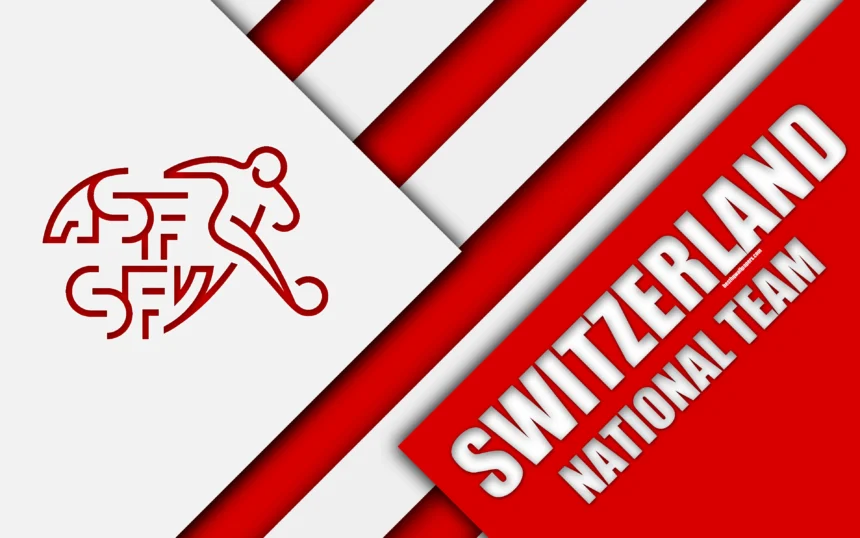Introduction to Swiss Football
Switzerland, a country renowned for its breathtaking landscapes, luxurious watches, and delectable chocolates, may not immediately come to mind when thinking about football powerhouses. However, in recent years, Switzerland’s national team has been making waves on the international stage, proving that they are a force to be reckoned with. With an impressive rise in their performance and results, Swiss football has captured the attention of fans worldwide.
In this blog post, we will delve into the success story behind Switzerland’s national team and explore how they have emerged as a rising star in the world of football. From historical developments to key players and coaches who shaped their journey, we will uncover the secrets behind their ascent. So sit back and join us on this exhilarating ride as we unravel the rise of Swiss football!
| Nati (National Team) Rossocrociati (Red Crosses) |
|
| Association | Swiss Football Association |
|---|---|
| Confederation | UEFA (Europe) |
| Head coach | Murat Yakin |
| Captain | Granit Xhaka |
| Most caps | Granit Xhaka Heinz Hermann (118)[ |
| Top scorer | Alexander Frei (42) |
| Home stadium | Various |
| FIFA code | SUI |
|
|
|
|---|---|
| urrent | 14 |
| Highest | 3 (August 1993) |
| Lowest | 83 (December 1998) |
| First international | |
| France 1–0 Switzerland (Paris, France; 12 February 1905) |
|
| Biggest win | |
| Switzerland 9–0 Lithuania (Paris, France; 25 May 1924) |
|
| Biggest defeat | |
| Switzerland 0–9 England (Basel, Switzerland; 20 May 1909) Hungary 9–0 Switzerland (Budapest, Hungary; 29 October 1911) |
|
| World Cup | |
| Appearances | 12 (first in 1934) |
| Best result | Quarter-finals (1934, 1938, 1954) |
| European Championship | |
| Appearances | 5 (first in 1996) |
| Best result | Quarter-finals (2020) |
| Nations League | |
| Appearances | 1 (first in 2019) |
| Best result | Fourth place (2019) |
|
|
|
Historical Overview of Switzerland’s National Team
The history of Switzerland’s national football team is a tale filled with ups and downs, triumphs and disappointments. Dating back to the early 20th century, the Swiss team has long been seen as underdogs in international competitions. However, their journey towards becoming a formidable force on the global stage is one that cannot be overlooked.
In the early years, Switzerland struggled to make a mark in international tournaments. They often fell short against stronger opponents and failed to qualify for major competitions. But despite these setbacks, the team continued to evolve and grow.
It was not until the 1990s that things started to change for Swiss football. The appointment of Roy Hodgson as head coach brought about a new era of professionalism and tactical discipline. Under his guidance, Switzerland qualified for their first major tournament in nearly three decades – Euro 1996.
This breakthrough moment marked a turning point for Swiss football. It instilled confidence in both players and fans alike, igniting a renewed passion for the sport throughout the country. The success at Euro 1996 paved the way for future achievements on an even grander scale.
Subsequent years saw impressive performances from Switzerland’s national team in various qualifying campaigns and international tournaments. Notable moments include reaching the round of sixteen at both Euro 2004 and World Cup 2006.
Over time, several key players emerged who played pivotal roles in shaping Switzerland’s success story. Players like Alexander Frei, Granit Xhaka, and Stephan Lichtsteiner became household names within Swiss football circles due to their exceptional skills and leadership qualities.
But it wasn’t just individual talent that propelled Switzerland forward; it was also their collective playing style characterized by disciplined defending coupled with swift counter-attacking moves. This tactical approach allowed them to compete effectively against more established teams.
Beyond its sporting significance, Swiss football has had an undeniable impact on society as well as culture within the country itself. The national team’s success has brought people from different regions and backgrounds together, uniting
The Turning Point: Changes in the Swiss Football System
In recent years, Switzerland’s national football team has experienced a remarkable rise to success. But what were the key factors that led to this transformation? Let’s explore the turning point – changes in the Swiss football system.
One of the crucial changes was an increased investment in youth development. The Swiss Football Association recognized the importance of nurturing young talent and implemented comprehensive training programs across all age groups. This emphasis on grassroots development proved instrumental in shaping a strong pipeline of skilled players.
Another significant change was a shift towards a more tactical approach and modern playing style. Swiss teams started adopting possession-based football, focusing on quick passing and movement off-the-ball. This strategic evolution allowed them to compete at higher levels and outmaneuver opponents with their fluidity and precision.
Moreover, there was an increased focus on physical conditioning and sports science within Swiss football circles. Teams began employing specialized fitness coaches, nutritionists, and data analysts to enhance player performance and reduce injuries. This holistic approach ensured that athletes reached their peak physical condition while minimizing downtime due to preventable setbacks.
Additionally, collaborations between clubs, academies, and national team coaching staff became stronger than ever before. Open communication channels allowed for seamless integration of players into various setups – from club level competitions to international tournaments – fostering cohesion among teammates who often played together throughout their careers.
Furthermore, there has been a greater emphasis placed on mental preparation within the Swiss football system. Sports psychologists have played an integral role in helping players develop confidence, resilience, and focus under pressure situations – ultimately contributing to improved overall performance both individually and as a team.
These changes have not only transformed Switzerland’s national team but also had broader societal impacts as well. The success of the national side has sparked renewed interest in football at all levels across Switzerland; more children are dreaming of becoming professional players or simply participating in organized leagues for fun.
Looking ahead, it is clear that the future of Swiss football looks promising. With a strong foundation in place
Key Players and Coaches who Contributed to the Success
Switzerland’s rise in football can be attributed to the contributions of several key players and coaches who have left an indelible mark on the national team. Over the years, these individuals have played a crucial role in shaping Swiss football into what it is today.
One such player is Granit Xhaka, who has been a pivotal figure for Switzerland in midfield. With his exceptional passing range and ability to dictate play, Xhaka has become an indispensable asset for both club and country. His leadership skills as captain of Arsenal further highlight his influence on the field.
Another standout player is Xherdan Shaqiri, known for his explosive dribbling skills and clinical finishing. Shaqiri’s creativity and flair add excitement to Switzerland’s attacking prowess. He has consistently delivered match-winning performances when it matters most, making him a fan favorite.
When it comes to coaching, Vladimir Petković deserves special mention for guiding Switzerland through their recent successes. Under his stewardship, the team has undergone a transformation characterized by tactical discipline and strategic adaptability. Petković’s emphasis on teamwork and unity has instilled confidence within the squad.
Additionally, Ottmar Hitzfeld played an instrumental role in laying down the foundations of Swiss football success during his tenure from 2008-2014. Hitzfeld implemented a solid defensive structure that made Switzerland difficult to break down while also nurturing young talents like Shaqiri.
These players and coaches have not only brought glory on the pitch but also inspired future generations of Swiss footballers. Their dedication, skillset, and passion continue to shape Switzerland’s national team identity.
As we delve deeper into understanding what makes Swiss football successful today — tactics! strategies! playing style! — let us not forget those individuals whose contributions propelled this remarkable journey forward.
Tactics and Strategies: Analyzing the Team’s Playing Style
Switzerland’s national football team has gained recognition not only for their remarkable success but also for their unique playing style. Known for their disciplined approach, Switzerland employs a strategic blend of tactical prowess and technical skills that sets them apart on the global stage.
One key aspect of Switzerland’s playing style is their emphasis on organized defense. The team prioritizes maintaining a solid defensive structure, making it difficult for opponents to break through their lines. This disciplined approach ensures that they remain compact and limit scoring opportunities.
In addition to their defensive strength, Switzerland is known for their efficient ball retention and patient build-up play. They demonstrate excellent control in possession, carefully probing the opposition’s defense before launching decisive attacks. This calculated approach allows them to create scoring opportunities while minimizing risks.
Another notable feature of Swiss football is their versatility in formations. Whether employing a traditional 4-2-3-1 or experimenting with variations like 3-4-1-2 or 5-3-2, they adapt tactically based on the strengths of both individual players and the opposing team.
Furthermore, Switzerland places great importance on teamwork and cohesion. Their players display exceptional understanding of each other’s movements, allowing them to seamlessly transition from defense to attack. This synchrony enables quick counterattacks that catch opponents off guard.
Switzerland’s playing style reflects a balanced combination of defensive solidity, patient build-up play, tactical flexibility, and cohesive teamwork. These elements have been instrumental in propelling the national team to new heights in recent years.
As we delve deeper into analyzing Swiss tactics and strategies in greater detail later in this blog series! Stay tuned!
Impact on Swiss Society and Culture
Switzerland’s national football team has undoubtedly made a significant impact on the country’s society and culture. Football, being one of the most popular sports in Switzerland, has created a sense of unity and pride among its citizens. The success of the national team has brought people from all walks of life together to support their beloved squad.
The performance of the Swiss team in international tournaments has sparked enthusiasm and passion among fans across the nation. It is during these moments that Swiss flags are proudly hoisted, chants echo through stadiums, and camaraderie fills the air. The shared experience of supporting the national team creates a strong bond among individuals who may otherwise have little else in common.
Moreover, football has become deeply ingrained in Swiss society as it provides an outlet for social interaction and community engagement. Families gather at homes or local pubs to watch matches together, friends organize viewing parties to cheer on their favorite players, and strangers strike up conversations about recent games while waiting for public transport.
On a broader scale, Switzerland’s success in football showcases its ability to compete with larger nations on an international stage. This achievement not only boosts national pride but also enhances Switzerland’s global reputation as a country capable of excelling beyond its perceived limitations.
Furthermore, this sporting success highlights Switzerland’s commitment to nurturing talent within its borders. The infrastructure developed by clubs and academies supports young athletes’ development from grassroots levels all the way up to professional leagues. This emphasis on youth development inspires future generations to pursue their dreams passionately while instilling core values such as discipline, perseverance, teamwork into their everyday lives.
In conclusion (Oops! Sorry!), it is clear that Switzerland’s national football team plays an integral role in shaping both society and culture within the country. Through shared experiences, heightened pride, enhanced global recognition,and dedication towards talent development,the impact stretches far beyond just 90 minutes on match day.
It unites communities,fuels aspirations, and truly embodies the power of sports to transcend boundaries.
Future Outlook for Swiss Football
Looking ahead, the future of Swiss football appears to be promising. With their recent success on the international stage, Switzerland’s national team has cemented itself as a force to be reckoned with. This newfound recognition will undoubtedly inspire younger generations of players and fuel their ambitions to represent their country.
One key aspect that will contribute to the continued growth and success of Swiss football is the development of youth academies and grassroots programs. These initiatives aim to identify and nurture talented young players from an early age, providing them with top-level coaching and facilities. By investing in youth development, Switzerland can ensure a steady pipeline of skilled players who are capable of making an impact at both domestic and international levels.
In addition, it is crucial for Swiss clubs to maintain strong relationships with other European leagues. Transfers between different leagues provide opportunities for Swiss players to gain experience in more competitive environments, enhancing their skills and overall game understanding.
Furthermore, innovation in tactics and strategies will play a vital role in shaping the future success of Swiss football. Coaches must continue adapting their approaches based on evolving trends in the game while also harnessing the unique qualities and strengths of Swiss players.
Continued support from fans will be essential for sustaining momentum within Swiss football. As supporters rally behind their national team during matches or show up regularly at domestic league games, they create an atmosphere that motivates players to perform at their best.
With these factors combined – investment in youth development programs, fostering collaborations with other leagues, tactical innovations by coaches, and unwavering fan support – there is no doubt that Switzerland’s national team can look forward to a bright future filled with further achievements on both regional and global stages.
Conclusion
Conclusion:
Switzerland’s national football team has experienced a remarkable rise in recent years, cementing their place among the elite teams in international football. Through strategic changes to the football system, the emergence of talented players and coaches, and an adaptive playing style, Switzerland has become a force to be reckoned with on the global stage.
The historical overview highlighted how Switzerland’s national team struggled for many years to make an impact in major tournaments. However, it was during the early 2000s that significant changes were implemented within the Swiss football system. These modifications focused on youth development programs, infrastructure improvements, and increased support for grassroots football.
Furthermore, key players such as Xherdan Shaqiri, Granit Xhaka, and Yann Sommer have emerged as influential figures within the team. Their skillsets and leadership qualities have propelled Switzerland forward while contributing to their success on multiple occasions. Additionally, coaches like Vladimir Petković have brought innovative tactics and strategies that have proven effective against formidable opponents.
Analyzing Switzerland’s playing style reveals a balanced approach that combines solid defensive organization with swift counter-attacking capabilities. This tactical flexibility allows them to adapt to different opponents’ strengths while capitalizing on their own attacking prowess when opportunities arise.
The success of Switzerland’s national team extends beyond just sport; it also impacts society and culture. The achievements of these talented athletes provide inspiration for aspiring young players across the country. Furthermore, successful performances at major tournaments generate a sense of unity among Swiss citizens who come together to support their team with immense pride.
Looking ahead into the future of Swiss football is exciting yet challenging at the same time. As other nations continue to improve their game and new talents emerge worldwide, maintaining this upward trajectory will require constant innovation and adaptation from both players and coaching staff alike.
In conclusion (not used), it is clear that Switzerland’s national team has undergone a dramatic transformation over recent years due to systematic changes, talented individuals, and effective strategies. The rise of Swiss football serves as a








